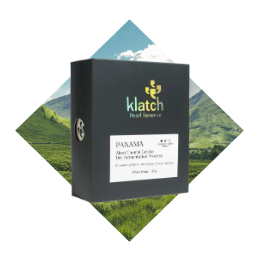
Panama Altieri Chombi Geisha Dry Fermentation Process
Tasting Notes
Strength/Intensity
5/10Roast
MediumAbout this Coffee
Panama Altieri Chombi Natural Geisha has a very complex flavor of fruitiness. Staring with strawberry, stone fruit of white nectarine and finishes with green grape. Looking to enhance the best attributes of the coffee, without losing the cleanness and elegance of their Natural Geisha classic, Altieri developed their Dry Fermentation Process (DF).
The Chombi lot is at an altitude of 1800 masl. The terrain is deeper and more inclined with fertile soil. It is mostly under the shadow next to the 25 hectares canyon of the forest reserve of the Baru Volcano in our Mima Estate farm at Callejon Seco, Boquete. This lot comprehends 1.4 ha.
Process DFS (Special Dry Fermentation): The cherry is manually selected and cleaned, to make sure it is completely mature. The beans are later sun dried in our greenhouse to lower water levels and to achieve optimal sugar concentration for 4 days. Then, they are placed into silage bags where they undergo an anaerobic fermentation process with natural soil wild yeast from our farm (natural bacteria) for 5 days under the shadow.
They are later placed in our dark drying room in African beds for 40 days at a control temperature of 18C. This dark room also counts with special fans to ensure the proper oxygenation of all cherries. Afterwards, the beans are placed in our controlled temperature warehouse for resting in grain pro bags.
In Dry Fermentation, the coffee cherry is manually selected and cleaned, to make sure it is completely mature. The beans were later sun dried in the greenhouse to lower water levels and to achieve optimal sugar concentration. Then, they were placed into silage bags where they underwent an anaerobic fermentation process with wild yeast from our farm (natural bacteria) for a couple of days with the minimum oxygen possible. Afterwards, the coffee was placed in African beds at 1800 masl to slow dry until 11% humidity was achieved. Finally, the lot ended resting in our temperature and humidity-controlled warehouse.
Altieri Specialty Coffee is a family-owned group of coffee growing farms from Boquete in Panama, founded by Eugene Altieri, an Italian American businessman residing in Panama. We have two farms located in Boquete, called Mima Estate in the area of Callejon Seco and Pipim Estate in the area of Alto Lino.
This area consists of volcanic soil, drained on the slope of the volcanic mountain, at an altitude where winds from the Pacific and Atlantic Oceans collide creating microclimates different from the rest of the country. Mima Estate (Callejon Seco) produces Geisha, Typica and Catuai, while Pipim Estate (Alto Lino) produces Caturra.
We produce varieties of Geisha, Typica, Catuai and Caturra. These prize-winning coffees are grown on the Eastern slope of the Baru Volcano, surrounded by the virgin cloud forests of the Baru National Park, at a height of between 1,600 and 2,200 meters above sea level, in an area known as Callejón Seco and Alto Lino.
After fifteen years of coffee growing and earning various awards, the second generation of the Altieri family are following Eugene’s legacy, working together to expand the Altieri Specialty Coffee brand. Given that family is in Altieri Specialty Coffee’s core values, our 10 lots’ names have special meaning; they are named after each of the Altieri family’s 10 grandchildren.
PRIZE-WINNING
These prize-winning coffees are grown next door to their neighbor Wilford Lamasus of Elida fame (who sold last years ASD Geisha for a World Record $1029 lb at auction) on the Eastern slope of the Baru Volcano, surrounded by the virgin cloud forests of the Baru National Park, at a height of between 1,700 and 2,200 meters above sea level, in an area known as Callejón Seco.
FARM
The Chombi lot is surrounded by the shadow of cigua palm trees, right at the middle of our Mimas Estate farm located in Callejon Seco, Boquete, on the eastern slope of the Baru Volcano. This area consists of volcanic soil, drained on the slope of the volcanic mountain, at an altitude where winds from the Pacific and Atlantic Oceans collide creating microclimates different from the rest of the country.